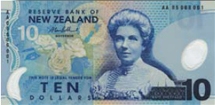 I wanted to buy a toy. I had four identical coins but these were not enough to pay for what I wanted, so I gave the shopkeeper a $10 note. He gave me two identical coins as my change. If I had had those coins before I could have paid the exact amount.
I wanted to buy a toy. I had four identical coins but these were not enough to pay for what I wanted, so I gave the shopkeeper a $10 note. He gave me two identical coins as my change. If I had had those coins before I could have paid the exact amount.
What could the coins I had before I bought the toy have been?
Solution:
Suppose that my coins were worth $x each and the shopkeeper's coins were worth $y each (where x and y may be 0.50, etc.).
Then the sweets were worth $10 - $2y. But they were also worth 4$x + 2$y. So 10 – 2y = 4x + 2y or 10 = 4x + 4y or 5 = 2x + 2y.
If y = 5/100 (or 5c), then 2x = 490/100, but we don’t have $2.45c coins.
If y = 10/100 (or 10c), then 2x = 480/100, but we don’t have $2.40c coins.
If y = 20/100 (or 20c), then 2x = 460/100, but we don’t have $2.30c coins.
If y = 50/100 (or 50c), then 2x = 4, and x = 2 – I had $2 coins.
If y = 1 (or $1), then 2x = 3, but we don’t have $1.50c coins.
If y = 2 (or $2), then 2x = 1, and x = 50/100 – I had 50c coins.
So, either I had four 50c coins and the cost of the toy was $6, or I had four $2 coins and the cost of the toy was $9.
Extension:
Try changing the various pieces of information in the problem. For example, what types of coins might you have had if you had had five coins to begin with?